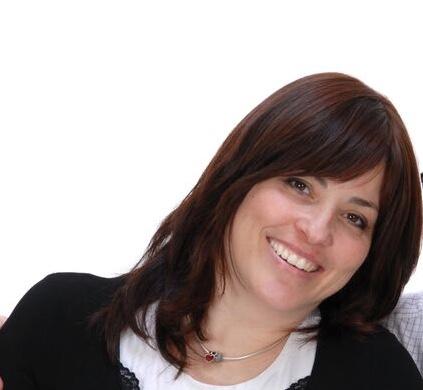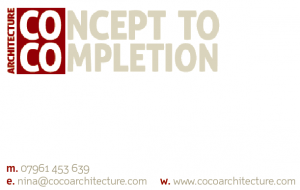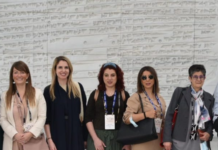
Nina Anders is an award winning, RIBA chartered architect with over 25 years’ experience. Since setting up her own business, COCO Architecture, just over 6 years ago, she has since been involved in some exciting projects including most recently with Rabbi Schneebalg’s Synagogue in Edgware, a project which was a finalist for the London Borough of Barnet’s design award 2017.
The name for her company, came about through much brainstorming between Nina and her husband, Tim Anders. She explains, “I wanted something that was memorable and different. we came up with the name COCO Architecture to illustrate how I cover all aspects of construction from COncept to COmpletion, and everything in between. I think it really shows what I am about”
Based in Edgware, Nina works across a range of clients from residential properties, to educational establishments such as schools and nurseries, to synagogues and medical buildings. She enjoys the variety that her job offers, and the chance to help people through her work. As she explains, “What I really like is being able to make the best of the space they have, and to create something that works for them. Whether it is adding an extension to a house, or creating a new learning space for a university. I like being able to help to make a difference to people’s lives in some way, I do this through improving the space they are in”
Having studied psychology of space as part of her Masters in Design and Architecture, Nina is good at making the best use of space and understanding how this works within different environments. She often works with couples and families to help them making the most of their living space. As a mother of four children, she understands first-hand how important it is to use space effectively, and she works with her clients to help find the right solution for them. “For me,“ Nina explains, “it is great to be able to help people enjoy their living spaces more, and to make them feel that their house is a home for them and their family.”
Nina always starts a new project by having an indepth consultation with the potential clients to find out what it is they want to achieve. With residential projects that can mean meeting with a couple, but for larger organisations this can be a whole committee. As part of this initial meeting, Nina will try to get a better understanding the client’s needs. She explains, “I like to find out what they want to achieve with the project. Particularly in the case of residential projects, I ask what they plan for the house in a year, five years, or even ten years. If they are looking to make this their family home for their future, then putting in the time and money makes sense, but if they are hoping to sell the house on in the near future, then doing something that will add to the value of the property is more advisable.” As part of the initial consultation, Nina can also suggest other professionals such as specialised designers, engineers and even planning consultants from her wide network that all come highly recommended.
Before meeting with clients, she encourages clients to make a scrapbook or collect images to show the kind of thing they are thinking, as sometimes it can be difficult to explain ideas. “Creating a moodboard really helps and gives something to work with. It means I can get into the mind of the client better. Design magazines can sometimes help, but they often present an unrealistic image, rather than a real liveable space, my job is to be creative, realistic and manage expectations.”
Once she has met with a client, and Nina has a clear idea of the brief and the task at hand, she will produce a document clearly setting out the process to reach the required end-goal together with a breakdown of proposed fees for the project, as well as her terms and conditions. Once these are agreed, she will then move on to the design process.
For this, Nina will produce drawings showing a wide range of design options, which she will then talk through with the client. She finds that people often like elements of all the drawings so will look at trying to combine these together in what she calls a ‘pick and mix’ approach. She will then create a second round of drawings, and discuss further with the client. If further comments or revisions are required, she will also do these. When the client is happy to proceed, Nina will submit relevant paperwork to the planning department on behalf of her client, before she moves on to liaising with engineers and builders.
Whilst this process is happening, Nina will set about getting together her team and get everything in place, so that she is ready to start work as soon as planning permission is granted. As well as working with clients in the initial design and pre-construction stages, she is also offers her services as project manager to oversee the construction phase.
When it comes to finding an architect for a project, Nina believes that it is important for people to find someone that you feel comfortable working with, and that you trust to do the job. As she explains, “Sometimes projects can take a significant amount of time from initial brief to final completion, and you want to be sure that you will be able to get on with that person.” Nina also suggests getting a few quotes and ideas from different companies, and not to make a decision based solely on the price quoted. “When I quote, I try to be as transparent as possible from the start, and the price that I give is inclusive of revisions at planning stage. Not all companies are like this, and often quotes that initially seem quite reasonable, start to add up once additional costs are added for revisions or meetings.” References are also important, and Nina would always recommend contacting previous customers or looking at work to get a better picture.
Nina really enjoys running her own business, and working from home gives her the flexibility to work around her family life. As a smaller company, she feels that she is able to offer clients a more personal service, and whereas more conventional architects offices will only work normal office hours, she is able to arrange client meetings in the evening or even on Sundays if required. “I think that is my USP, and it makes it much easier for my clients to meet me and to work around their own schedules as well.” For many, working from home can be great, especially when first starting out as it is a way to reduce overheads which are key when starting a business. Nina recognises that working this way requires organisation and self discipline as it can be easy to get distracted by elements of home life. “For some people, it can be difficult to resist the urge to do the laundry or housework, so they often find renting an office space is more effective.”
Another thing to consider when starting out, is to know your market and be aware of other companies in the same area. There can also be a large amount of expense involved in starting your own business, and whilst some people choose to get a large bank loan and set everything up all at once, Nina preferred to start small and to build her business gradually without overstretching herself financially.
Working with people is a big part of Nina’s job, and she really enjoys interacting and helping them. “Every project is different, and there are so many different variables involved which makes it really exciting. Being able to work with different lighting, materials, colours and daylight options to create the ideal environment is really enjoyable. As an architect, you have to be flexible and open to your clients needs, but also offer advice and guidance to enable them to make the right decisions, so that they are happy with the end results”
You can contact Nina on Nina@cocoarchitecture.com for advice or to organise an initial consultation, or by phone on 07961 453 639.
Do you know anyone who specialises in an area of female expertise and would like to be featured on this page? Let us know by emailing
micaela@thejewishweekly.com








